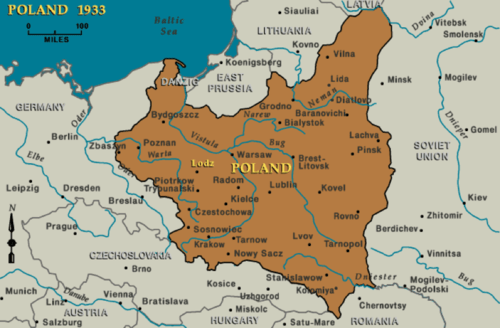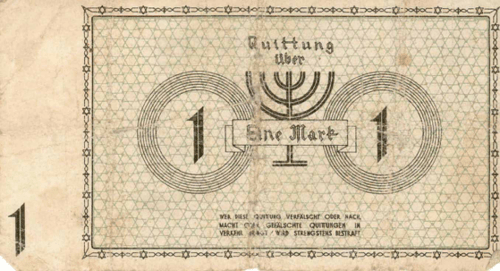The Lodz Ghetto and Rywka Lipszyc
Context
Soon after the Nazis invaded Poland in September 1939, they began to establish ghettos: areas of towns and cities for exclusively Jewish residence. Ghettos took many forms, but they all functioned to restrict Jewish movement and physically separate Jews from the rest of the population. Ghettos were usually constructed in a disadvantaged area, marked by crowding, poverty, and poor sanitation. A Jewish Council (or Judenrat) was often appointed in ghettos, a set of community leaders subject directly to the Nazi administration. By 1942, many ghettos served as a tool in implementing the Nazis’ Final Solution (extermination of the Jews). They weakened Jews physically—through starvation and illness—spiritually, and mentally.
One of the first ghettos to be established in Poland was the Lodz ghetto, in February 1940.
The Jews of Lodz (about 200,000 persons) packed up their belongings on their backs or by wagon and crowded into the slums in the northern part of the city, often 7 people or more to a small room. The crowding worsened in late 1941 and 1942, when the Nazis deported tens of thousands of Jews from Central Europe to Lodz.
The Lodz ghetto was the longest-lasting ghetto in Poland. Lodz was an industrial city, and the Nazis needed the textiles (fabrics) that it produced. Yet Lodz Jews received rations that could not possibly sustain them. Coal and other sources of heat were scarce in the winter. 20% of ghetto inhabitants died of illness or starvation.
One of the inhabitants of the Lodz ghetto was a young woman named Rywka Lipszyc. Born in Lodz in 1929, Rywka had moved to the ghetto in 1940 together with her parents and her three younger siblings. Her father soon died of a beating at the hands of the Germans; her mother, like many other ghetto inhabitants, succumbed to illness and starvation in 1942. Two of Rywka’s younger siblings were deported from the ghetto to a death camp in September 1942. Rywka and her remaining sister, Cipka, were sent to live with three older cousins, all girls. Rywka was 14 years old. During the day, she worked in a small sewing factory. When she had a spare minute, she wrote in her diary.
Rywka was not unusual in writing a diary: Jewish young men and women across Europe chronicled the experience of being targeted solely because they belonged to the Jewish “race.” As the Nazis purposefully sought to destroy communal and family structures, both young men and women were forced to adopt new roles and faced challenging living environments. They both struggled with the universal questions of adolescence: who am I, and where do I fit in? Yet in ghettos specifically, men often fell prey first to starvation; they were more often the targets of Nazi violence and more often subjected to hard labor. In their absence, women assumed additional economic and, in certain cases, religious roles.
Before the war, religious families such as Rywka’s were just beginning to consider expanded roles for women. Rywka attended a Beys Yakov school, which encouraged women to engage in religious study—a subject previously limited only to boys. In the ghetto, Rywka continued to attend her religious study circles. Yet at home, she struggled with her new roles and with the disintegration of her family. The novelist and critic Virginia Woolf, who famously advocated that women have “a room of their own,” had not yet been translated in Poland. But in Rywka’s traumatic circumstances, she too, like her British counterpart, yearned for her own “shelter to call home.”
Currency Issued by the Jewish Council in the Lodz Ghetto
Currency issued by the Jewish Council in the Lodz Ghetto. Courtesy of Tauber Holocaust Library and Archives at JFCS Holocaust Center.
Excerpt from Rywka Lipszyc’s diary, Friday February 11, 1944
[…] Oh, it’s Friday again! Time goes by so fast! And for what? Do we know? What’s waiting for us in the future? I’m asking this question with both fear and youthful curiosity. We have an answer to this, great answer: God and the Torah! Father God and Mother Torah! They are our parents! Omnipotent, Omniscient, Eternal!!! It’s so powerful!!! In front of this I’m just a little creature that can hardly be seen through the microscope. Well … oh, I’m laughing at the entire world—I, a poor Jewish girl from the ghetto—I, who don’t know what will happen to me tomorrow … I’m laughing at the entire world because I have a support, a great support: my Faith, because I believe! Thanks to it I’m stronger, richer and more worthy than others … God, I’m so grateful to you!!! …
Excerpt from Rywka Lipszyc’s diary, Tuesday February 25, 1944
[Context: Rywka has just had a fight with her older cousin, who threatens to throw Rywka out of the house]
She keeps saying that she is pleased with me, but now? Right now, would she say that she doesn’t want me anymore? It seems so unbelievable. Oh, is this the right time to think about it? Not only are the times horrible and tragic, but I don’t even have a shelter called “home.” I recall a sentence from A Light in the Darkness, “Even the most modest place, but your own.” Oh, it is so true! That’s why I am so cold!...I feel like crying! Cry, scream from this vast pain surrounding me! Oh, God! Things feel so constricted here! So stuffy!
Excerpt from Rywka Lipszyc’s diary, Monday February 28, 1944
A few years ago, in my dreams, when I was imagining my future, I could see sometimes: an evening, a studio, a desk, there is a woman sitting at the desk (an older woman), she’s writing…and writing, and writing…all the time…she forgets about her surroundings, she’s writing. I can see myself as this woman. Another time I could see a modest apartment which I share with my sister—earlier I thought it was Tamarcia [Rywka’s sister who was deported], but today it’s more probable that it’s Cipka. Some other time I can see: an evening, a modest room with lights, all my family sitting at the table. It’s so nice…so warm, cozy…Oh, it’s so good! Later, when they all go to bed, I sit at the sewing machine and I’m sewing…sewing…it’s so sweet, so good…so delightful! Because everything I make with my own hands is our livelihood. It pays for bread, education, clothes…almost everything.
Postscript
Like other inhabitants of the Lodz ghetto, Rywka was sent to Auschwitz in August 1944. She survived a death march to Bergen Belsen, was liberated there by the British army, and was sent to a hospital in Germany. This is the last record we have of her. Yet the diary that Rywka Lipszyc kept over the years 1943-4 was found at Auschwitz by the liberating Red Army and was amazingly preserved for 70 years. It was recently published by the JFCS Holocaust Center.
Discussion questions
- What were some of the challenges of life in the ghetto for Rywka?
- What role did religion play for Rywka in the ghetto?
- Why do you think Rywka refers to God as her “Father” and the Torah as her “Mother”?
- What do you think being a woman meant for Rywka?
- What things or thoughts brought Rywka a sense of inner stability and comfort? What did she think of as “home”?




